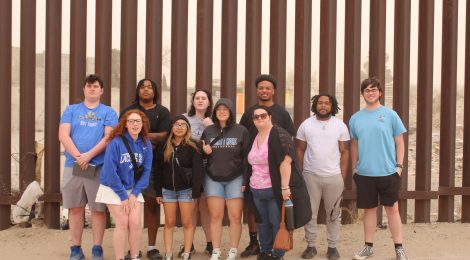
Thomas More students reflect on the borderlands — El Paso, social teaching and immigration
This article was originally published by the Messenger, the Catholic news service of the Diocese of Covington, appearing in its June 27, 2025 print issue, and is republished with permission.
By: Maura Baker, Staff Writer, Messenger
Last March, a group of students from Thomas More University headed southwest to the U.S.–Mexico border in El Paso, Texas. Working alongside the Annunciation House, a nonprofit sheltering and providing assistance to migrants in the region, the students participated in what was known as a “Border Awareness Experience.”
The experience introduced students to the realities of immigration and life in the borderlands, as well as the functions and day-to-day operations of the Annunciation House nonprofit. Students also heard from people living the day-to-day in the region first hand, with talks from individuals ranging from a border patrol officer, to an attorney, to migrant families themselves.
“When you go down there and you’re with those people, it’s like you can really see their hearts,” Elijah White, one of the students who visited El Paso, told the Messenger in an interview. “They (migrants) are just people that want to live a life that we live every day.”
In May, many of the students, who also participated in a class led by Dr. James Camp at Thomas More this past year, returned to El Paso for a second round of their border experience. Dr. Camp, who is also on the board of the Annunciation House, takes these trips with students annually — and the second trip onwards for students is focused more on service than learning.
While back in El Paso this May, students participated in a lot of chore-based work, including cooking meals, painting walls and other general maintenance of the buildings that Annunciation House uses to house and care for migrants. Perhaps one of the most impactful parts of this return experience, according to Thomas More student Heidi Lopez, was the students’ participation in Annunciation House’s intake process.
Receiving people directly from ICE, students witnessed the drop-off, intake paperwork, and heard the stories of new guests to the Annunciation House. “Hearing the stories makes you feel more connected to them,” said Ms. Lopez. “I’m glad something like this exists in an area that needs it, with people in need.”
The Annunciation House has no limit on how long families can stay, and helps them along the way with the process of immigration or other legal matters, as well as providing food, clothes, hospitality and other basic necessities. The mission of Annunciation House is described as “accompanying the migrant, refugee and economically vulnerable peoples of the border region through hospitality, advocacy and education.” A fundamentally Catholic institution, the Annunciation House focuses on the importance of the Catholic social teaching of empathy to the migrant.
“People wouldn’t give up everything they know just because they want to,” Ms. Lopez said, based on her experience from the borderlands. “They’re not just numbers, they’re people with lives and dreams.”
_______________________________________________________________________________________________________________
For 25 years, the Border Studies Program has connected Thomas More students to issues surrounding immigration, through the foundation of Catholic social teaching and service learning. Read more about this program and its rich history at Thomas More University here.

Comments are closed, but trackbacks and pingbacks are open.